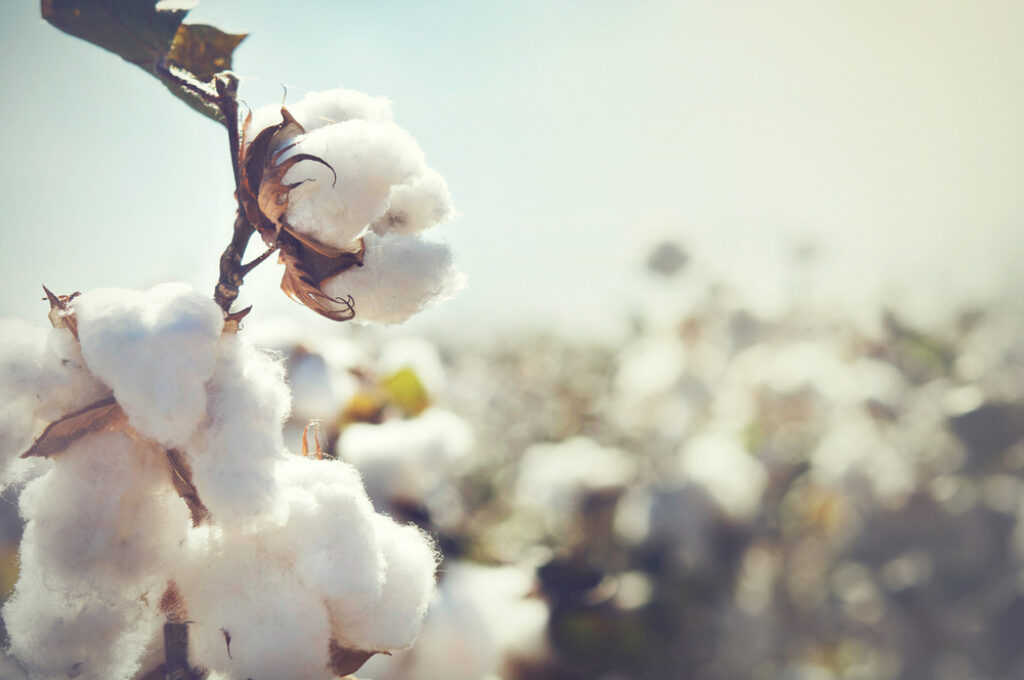Spotlight on sustainability: 'ecologically' grown cotton
Today we give you a deeper look at our own work within the Organic Content Standard (OCS), and at what ‘eco cotton’ or ‘organic agriculture’ really mean for you, the consumers of FibreGuard’s gorgeous, easy-clean fabrics.
Describing cotton as ‘organic’ comes with a lot of boxes to tick
Simply put, organic cotton is grown using regulated, traceable methods and materials that have a low impact on the environment.
Climate action starts at the source of the materials we choose. – Textile Exchange
Organic agricultural systems such as those used to grow certified organic cotton focus on different areas:
- Nourishing and maintaining soil fertility
- Reduce the use of toxic and persistent pesticides and fertilisers
- Attempt to build or restore biologically diverse local ecosystems that had been destroyed or damaged by previous farming practices
The International Federation of Organic Agriculture Movements (IFOAM - Organics International) described it as: “Organic Agriculture is a production system that sustains the health of soils, ecosystems, and people. It relies on ecological processes, biodiversity and cycles adapted to local conditions, rather than the use of inputs with adverse effects. Organic Agriculture combines tradition, innovation, and science to benefit the shared environment and promote fair relationships and good quality of life for all involved.”
Only material from certified organic farms (under one of IFOAM’s Family of Standards) is accepted into the OCS.
Related: read about all of FibreGuard’s eco-labels, from the STANDARD 100 by OEKO-TEX® to the ISO 9001 company certification standard.

Organic cotton and responsible water use
Cotton that is farmed organically is the result of dedicated teams that support farmers in their water and chemical usage. Farmers are then empowered to use water in a way that is environmentally sustainable, economically advantageous, and socially justifiable. In turn, this can strengthen a region’s resilience to climate change and minimise negative impacts on water quality.
Soil health and reduced need for chemical use in cotton growing
A better understanding and protection of soil is another strand in the overarching story of organic cotton. Healthy soil leads to higher quality cotton yields, reduces the need for expensive fertiliser, pesticides, or labour costs, and can more easily withstand unpredictable weather changes caused by climate change.
Healthy soil also helps to diminish the local effects of climate change, as it is better able to isolate carbon, serving as a carbon sink.
Find out more about our textile production processes by getting in touch.

Recap: The Organic Content Standard (OCS) in brief
This eco-label makes it easier for consumers to confirm whether goods contain organic materials. How it works: Based on their composition, fabric is either awarded the ‘Organic Content Standard 100’ for fabrics containing more than 95% organic fibre, or the ‘OCS Blended – Organic Content Standard’ for fabrics containing between 5% and 95% organic fibre. Please refer to our FibreGuard fabric samples to confirm which collections are OCS certified. Our unique OCS number is 1036513.


Enhancing biodiversity and using land responsibly
Like everything within the ‘sustainability’ umbrella, biodiversity is a multifaceted topic because everything we need to do to mitigate the effects of climate change hangs in an ecosystem of checks and balances. Organic cotton agriculture helps to conserve and enhance biodiversity on farms through simple techniques such as
- Using natural pest management processes (including crop rotation)
- Identifying degraded agricultural areas and investing in soil health
The organic content standard and FibreGuard
For some time now, we have ensured that as many of our fabrics as possible adhere to stringent environmental standards relating to production, sustainability, and ecology.
As well as creating beautiful, easy-to-clean fabrics for the home, the workplace, and the hospitality industry, at FibreGuard we're also deeply committed to the principles of sustainable design.
Consumer safety and environmental responsibility lie at the heart of our manufacturing processes, as does our dedication to quality management under Quality, Environment, Safety and Health (QESH) guidelines. Our work with organic content standards is part of this, of course.